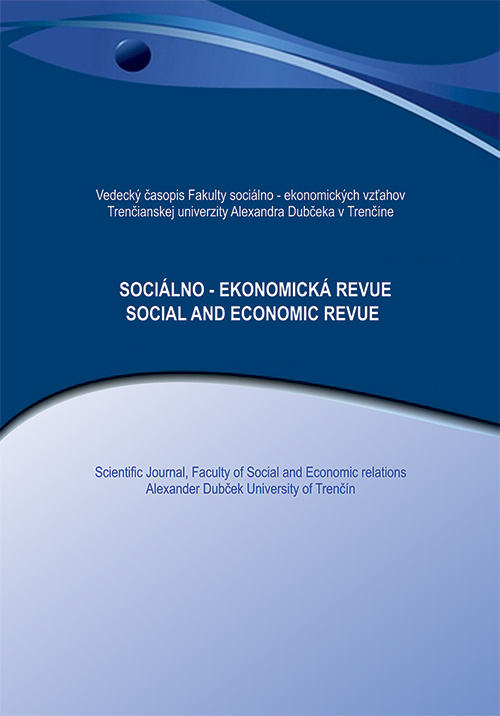THE LABOUR FORCE MIGRATION IMPACT ON COUNTRIES WITH DIFFERENT ECONOMIC DEVELOPMENT LEVEL
The impact of labour force migration on the economies of the world has grown recently because of the gradual increase in the movement of people and the changes in the nature and direction of migration. The authors of the article are investigating the impact of labour force migration processes on the economies of the countries of different degrees of development taking into consideration controversial treatment of the concept of migration in the scientific literature. The studies carried out by the authors show that the impact of the labour force migration on different levels of economies depends on the country's level of development. The less developed the country's economy, the more damage is done by the migratory (emigration) processes. On the contrary, the more developed the country's economy, the more increasing positive effect is characteristic to the processes of migration (immigration). The increase in the population indicates a decrease in the unemployment rate and the lower is the unemployment rate, the higher is the gross domestic product.
Vydanie: 2018/3 Strany: 23-29 Klasifikácia JEL: F16, J21, J61
DOI:
Kľúčové slová: labour force, migration, economic development, economic development level
Sekcia: SOCIAL CONTEXT OF THE ECONOMY, LABOR MARKET AND HUMAN RESOURCES DEVELOPMENT
Kontakty:
Valentinas Navickas, prof.
Department of Management and Development of Human Resources
Faculty of Social and Economic Relations
Alexander Dubček University in Trenčín
Študentská 3, 911 50 Trenčín, Slovensko
e-mail: valentinas.navickas@tnuni.sk
Joana Žukauskienė,
Department of Economics;
School of Economics and Management,
Kaunas University of Technology, Lithuania
e-mail: joana.zukaus@gmail.com
Literatúra:
Basevičiūtė, A., Kajola, L., Milašius, V., Petkauskas, V. (2011). Emigracijos mastų skirtumai kaimyninėse valstybėse: Lietuvos ir Estijos atvejai. [online]. [cit.: 2018-04-07]. Retrieved from: http://etalpykla.lituanistikadb.lt/fedora/objects/LT-LDB-0001:J.04~2011~1367178352584/datastreams/DS.002.0.01.ARTIC/content
Beržinskienė, D., Reizgevičienė, R., Reizgevičius, M. (2010). Migracijos įtaka darbo rinkai. [online]. [cit.: 2018-04-07]. Retrieved from: http://etalpykla.lituanistikadb.lt/fedora/get/LT-LDB-0001:J.04~2010~1367176182442/DS.002.0.01.ARTIC6.
Česnavičius D., Stanaitis S. (2015). Lietuvos gyventojų migracija Europos išūkių kontekste. Lietuvos edukologijos universitetas. [online]. [cit.: 2018-04-07]. Retrieved from: file:///C:/Users/Vartotojas/Desktop/emigracija.pdf
Dudzevičiūtė, G. (2015). Ekonomikos plėtros pagrindai. Mokomoji knyga. Vilnius. file:///C:/Users/Vartotojas/Desktop/plėtros%20ekonomika/studentams_literatura/knyga%20ekonomikos%20pletros%20pagrindai_internetui.pdf
Garif, F.(2013). The Impact of Migration and Remittances on Wealth Accumulation and Distribution in Rural Thailand. [online]. [cit.: 2018-04-07]. Retrieved from: http://web.a.ebscohost.com/ehost/pdfviewer/pdfviewer?vid=15&sid=37eb508b-bf2d-4db5-bf96-dd3eaf9ccc05%40sessionmgr4009
Janušauskas, A., Nedzinskas E., Uleckas A., Vepšta P. (2009). Šiolaikiniai migracijos procesai ir jų įtaka Lietuvos darbo rinkai. [online]. [cit.: 2018-04-07]. Retrieved from: http://etalpykla.lituanistikadb.lt/fedora/objects/LT-LDB-0001:J.04~2009~1367170842318/datastreams/DS.002.0.01.ARTIC/content
Kasnauskienė G., Buzytė L. (2011). Emigrantų piniginiai pervedimai ir jų poveikis ekonomikai. Akademinis žurnalas, Vilnius. Lietuva. [online]. [cit.: 2018-04-07]. Retrieved from: http://web.b.ebscohost.com/ehost/pdfviewer/pdfviewer?vid=4&sid=cc923b56-ea64-47d4-b393-136e5d1daeb6%40sessionmgr120
Lietuvos statistikos departamentas. (2018). Europos statistikos duomenų konsultantai. [online]. [cit.: 2018-04-07]. Retrieved from: http://eurostatgidas.stat.gov.lt/lt/
Matiušaitytė, R. (2003). Darbo jėgos migracija Europos Sąjungoje ir Lietuvoje. [online]. [cit.: 2018-04-07]. Retrieved from: file:///D:/migracija%20medžiaga/migracija1.pdf
Migration Policy Debates. (2014). [online]. [cit.: 2018-04-07]. Retrieved from: https://www.oecd.org/migration/OECD%20Migration%20Policy%20Debates%20Numero%202.pdf
Palat, M., (2012). Effects of Labour migration on economic developement during economic downturn and recovery. [online]. [cit.: 2018-04-07]. Retrieved from: https://acta.mendelu.cz/media/pdf/actaun_2012060070207.pdf
Samchkuashvili, N., Darchiashvili, N. (2017). Problems and Results of Labor Migration in Georgia. [online]. [cit.: 2018-04-07]. Retrieved from: http://web.a.ebscohost.com/ehost/pdfviewer/pdfviewer?vid=17&sid=37eb508b-bf2d-4db5-bf96-dd3eaf9ccc05%40sessionmgr4009
Sinevskaitė E., Andriuškaitienė D. (2015). Mokslas Lietuvos ateitis. Lietuvos jaunimo migrantų nuostatų tyrimas. [online]. [cit.: 2018-04-07]. Retrieved from: http://web.a.ebscohost.com/ehost/pdfviewer/pdfviewer?vid=10&sid=c14ec89e-d0b4-4a74-bb71-9af752fae19f%40sessionmgr4007
Taylor Edward, J. (1999). The New Economics of Labour Migration and the Role of Remittances in the Migration Process. [online]. [cit.: 2018-04-07]. Retrieved from: http://web.a.ebscohost.com/ehost/pdfviewer/pdfviewer?vid=22&sid=37eb508b-bf2d-4db5-bf96-dd3eaf9ccc05%40sessionmgr4009
Valstybės, Ž. (2006). Emigracija iš Lietuvos: padėtis, problemos, galimi sprendimo būdai. Konferencijos medžiaga. Vilnius. [online]. [cit.: 2018-04-07]. Retrieved from: http://www3.lrs.lt/docs2/TKAKCQXM.PDF
Pukelienė, V., Glinskienė, R., Beržinskienė, D. (2007). Darbo jėgos migracija: globalinis aspektas. Taikomoji ekonomika: Sisteminiai tyrimai. [online]. [cit.: 2018-04-07]. Retrieved from: https://eltalpykla.vdu.lt/bitstream/handle/1/1325/ISSN1822-7996_2007_T_1.N_2.PG_49-64.pdf?sequence=1&isAllowed=y
Žibas, K., Petrušauskaitė V. (2015). Darbo migrantai Europoje ir Lietuvoje: gyvenimo ir darbo sąlygų problematika. Etniškumo studijos. Lietuvos socialinių tyrimų centras. [online]. [cit.: 2018-04-07]. Retrieved from: http://www.ces.lt/wp-content/uploads/2015/09/2-Petru%C5%A1auskait%C4%97-%C5%BDibas_EtnSt-2015_1.pdf


